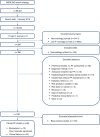Overinterpretation and misreporting of prognostic factor studies in oncology: a systematic review
- PMID: 30353050
- PMCID: PMC6251031
- DOI: 10.1038/s41416-018-0305-5
Overinterpretation and misreporting of prognostic factor studies in oncology: a systematic review
Abstract
Background: Cancer prognostic biomarkers have shown disappointing clinical applicability. The objective of this study was to classify and estimate how study results are overinterpreted and misreported in prognostic factor studies in oncology.
Methods: This systematic review focused on 17 oncology journals with an impact factor above 7. PubMed was searched for primary clinical studies published in 2015, evaluating prognostic factors. We developed a classification system, focusing on three domains: misleading reporting (selective, incomplete reporting, misreporting), misleading interpretation (unreliable statistical analysis, spin) and misleading extrapolation of the results (claiming irrelevant clinical applicability, ignoring uncertainty).
Results: Our search identified 10,844 articles. The 98 studies included investigated a median of two prognostic factors (Q1-Q3, 1-7). The prognostic factors' effects were selectively and incompletely reported in 35/98 and 24/98 full texts, respectively. Twenty-nine articles used linguistic spin in the form of strong statements. Linguistic spin rejecting non-significant results was found in 34 full-text results and 15 abstract results sections. One in five articles had discussion and/or abstract conclusions that were inconsistent with the study findings. Sixteen reports had discrepancies between their full-text and abstract conclusions.
Conclusions: Our study provides evidence of frequent overinterpretation of findings of prognostic factor assessment in high-impact medical oncology journals.
Conflict of interest statement
The authors declare no competing interests.
Similar articles
-
Folic acid supplementation and malaria susceptibility and severity among people taking antifolate antimalarial drugs in endemic areas.Cochrane Database Syst Rev. 2022 Feb 1;2(2022):CD014217. doi: 10.1002/14651858.CD014217. Cochrane Database Syst Rev. 2022. PMID: 36321557 Free PMC article.
-
Overinterpretation of findings in machine learning prediction model studies in oncology: a systematic review.J Clin Epidemiol. 2023 May;157:120-133. doi: 10.1016/j.jclinepi.2023.03.012. Epub 2023 Mar 17. J Clin Epidemiol. 2023. PMID: 36935090 Review.
-
A systematic review finds that spin or interpretation bias is abundant in evaluations of ovarian cancer biomarkers.J Clin Epidemiol. 2019 Dec;116:9-17. doi: 10.1016/j.jclinepi.2019.07.011. Epub 2019 Jul 19. J Clin Epidemiol. 2019. PMID: 31330251 Review.
-
Misleading Reporting (Spin) in Noninferiority Randomized Clinical Trials in Oncology With Statistically Not Significant Results: A Systematic Review.JAMA Netw Open. 2021 Dec 1;4(12):e2135765. doi: 10.1001/jamanetworkopen.2021.35765. JAMA Netw Open. 2021. PMID: 34874407 Free PMC article.
-
Overinterpretation and misreporting of diagnostic accuracy studies: evidence of "spin".Radiology. 2013 May;267(2):581-8. doi: 10.1148/radiol.12120527. Epub 2013 Jan 29. Radiology. 2013. PMID: 23360738
Cited by
-
Linguistic spin in randomized controlled trials about age-related macular degeneration.Front Epidemiol. 2022 Oct 31;2:961996. doi: 10.3389/fepid.2022.961996. eCollection 2022. Front Epidemiol. 2022. PMID: 38455287 Free PMC article.
-
Structured reporting to improve transparency of analyses in prognostic marker studies.BMC Med. 2022 May 12;20(1):184. doi: 10.1186/s12916-022-02304-5. BMC Med. 2022. PMID: 35546237 Free PMC article. Review.
-
Could palliative sedation be seen as unnamed euthanasia?: a survey among healthcare professionals in oncology.BMC Palliat Care. 2023 Jul 19;22(1):97. doi: 10.1186/s12904-023-01219-z. BMC Palliat Care. 2023. PMID: 37468913 Free PMC article.
-
Tumor Mutation Burden Predicts Relapse in Papillary Thyroid Carcinoma With Changes in Genes and Immune Microenvironment.Front Endocrinol (Lausanne). 2021 Jun 23;12:674616. doi: 10.3389/fendo.2021.674616. eCollection 2021. Front Endocrinol (Lausanne). 2021. PMID: 34248843 Free PMC article.
-
An overview of statistical methods for biomarkers relevant to early clinical development of cancer immunotherapies.Front Immunol. 2024 Aug 21;15:1351584. doi: 10.3389/fimmu.2024.1351584. eCollection 2024. Front Immunol. 2024. PMID: 39234243 Free PMC article. Review.
References
Publication types
MeSH terms
Substances
Grants and funding
LinkOut - more resources
Full Text Sources


